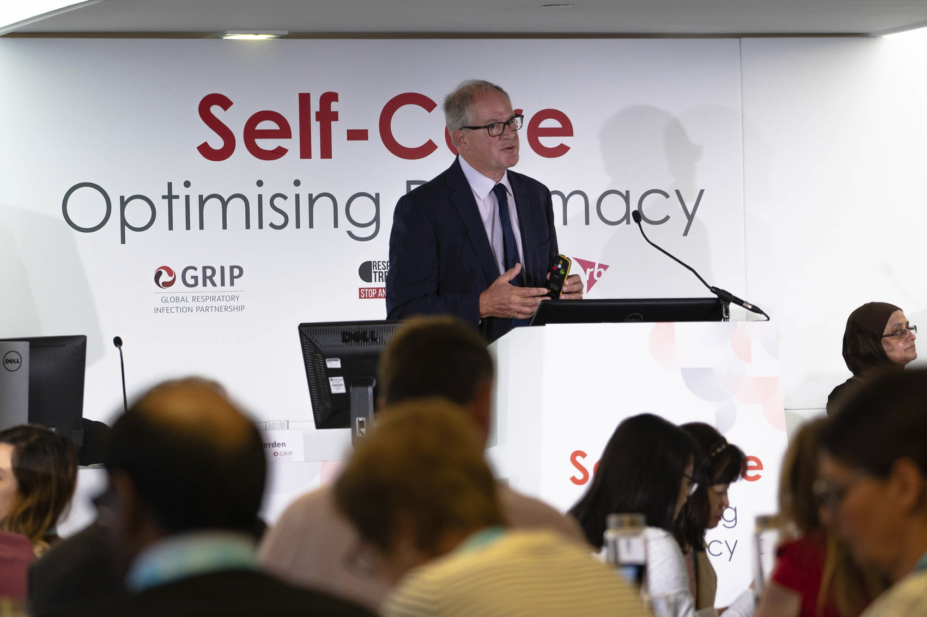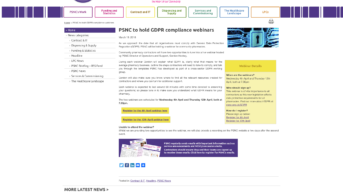
Courtesy of Reckitt Benckiser
Community pharmacists are central to reducing the inappropriate use of antibiotics in upper respiratory tract infections (URTIs), according to Martin Duerden, a GP and honorary senior research fellow at Bangor University, Wales.
Duerden was speaking during a Global Respiratory Infection Partnership (GRIP) symposium on “Self-care: Optimising pharmacy” at the 2018 International Pharmaceutical Federation (FIP) Congress in Glasgow on 5 September 2018.
Introducing the session, which was hosted by UK healthcare company Reckitt Benckiser, Sabiha Essack, dean of the School of Health Sciences and professor of pharmaceutical sciences at the University of KwaZulu-Natal, South Africa, said by 2050, 10 million deaths could occur annually as a consequence of antimicrobial resistance (AMR), largely in developing countries. During the same timescale, 28 million people are predicted to fall into poverty as a consequence of AMR.
The global impact would be similar to the 2008 financial crisis, Essack said, adding that: “we will not recover from this loss”.
Against this backdrop, Essack introduced GRIP and highlighted its ‘pentagonal framework for change’ — a five-part framework for the non-antibiotic management of URTIs which focuses on policy, prevention of resistance, prescriber guidance, patient empowerment and pharmacists as stewards and educators.
Duerden, who is also a clinical adviser on prescribing and evidence-based medicine for the Royal College of GPs, spoke about two of these aspects: patient input and pharmacist guidance, and how patients can be inspired to avoid antibiotic prescriptions.
There is, he said, often a mismatch between what the patient wants and what their GP thinks they want. “Research suggests patients are prescribed antibiotics [for URTIs] in greater proportions than those who go in thinking they need an antibiotic,” he said. He was backed up by another doctor — Atilla Altiner, head of the Institute of the General Practice of the University of Rostock, Germany. “We always overestimate the patients’ demand for antibiotics,” Altiner said. His experience is that patients “mainly see doctors for an explanation; for reassurance that their illness is not something more serious.” The language used by healthcare professionals is important, he said: “Telling a patient ‘It’s just a virus’ isn’t always reassuring. People know that viruses can be serious — HIV, for example.”
Healthcare professionals need to help patients understand that symptoms of URTIs typically last longer than many people realise, Duerden said, noting that coughs, for example, can last as long as three or four weeks. It is here that pharmacists can make a big difference, he added, pointing out that the NHS guidance for URTIs signposts patients to pharmacists first and that NICE guidance on antibiotic prescribing for acute sore throat highlights the value of pharmacists as a source of self-care advice.

Source: Courtesy of Reckitt Benckiser
John Bell, former president of the Pharmaceutical Society of Australia and the Commonwealth Pharmacists Association, discussed a study in which 44% of doctors had prescribed antibiotics “just to get rid of a patient”
John Bell, former president of the Pharmaceutical Society of Australia and the Commonwealth Pharmacists Association, echoed Duerden’s sentiments. Bell cited a survey in which 70% of doctors responding had prescribed antibiotics even when they were unsure that a patient’s infection was bacterial. He also pointed to research which found that 44% of doctors in a study had prescribed antibiotics “just to get rid of a patient”. Behaviours like these, he said, perpetuate a myth in the community that antibiotics are always needed.
In the face of increasing resistance to antimicrobials, Bell told delegates that pharmacists should give patients realistic expectations about the severity and duration of symptoms, and recommend evidence-based products for self-care. Aurelio Sessa, a physician and a member of the Italian Ministry of Health’s committee for influenza, pointed to Irish data which showed that giving patients a self-care leaflet alongside verbal info provided better results and reduced consultation time.
And patients generally do trust the advice they receive from pharmacists, said Douglas Burgoyne, president of Veridicus Health. According to a survey co-authored by Burgyone and Essack, 68% of patients in 13 countries said they believed what their pharmacist told them, although there were large regional variations noted — only 47% of Russians placed full trust in their pharmacist’s advice, compared to 90% of Saudi Arabians.
Alike van der Velden, assistant professor at the University Medical Center, Utrecht, the Netherlands, spoke of the impact policy change has had on inappropriate prescribing. Dutch citizens take an average of 0.4 courses on antibiotics each year, compared with an average of 2 per year in France and Greece, van der Velden said. This difference was backed up by Sessa, who said that the Mediterranean region has the highest prescription rate in the EU, despite no difference in infectious disease epidemiology.
Despite the relatively low rate of antibiotic prescribing in the Netherlands, an estimated 46% of Dutch antibiotic prescriptions for respiratory tract infections are unnecessary, van der Velden said. To address this, “Hospital A-teams” have been introduced, tasked with monitoring and improving prescribing, and consequently appropriate antibiotic prescriptions in Dutch hospitals increased from 64% to 77% according to a one-year impact assessment.
Taking a complementary tack were Roman Kozlov, director of the Institute of Antimicrobial Chemotherapy at Smolensk State Medical Academy, Russia, and Antonio Carlos Pignatari, director of the Special Clinical Microbiology Laboratory of the Division of Infectious Diseases at the University of São Paulo, Brazil, who emphasised the importance of infection prevention. Vaccinations are an essential tool against antimicrobial resistance, both directly and indirectly, Kozlov said, while Pignatari highlighted the importance of good sanitation and physical barriers against infection. “The use of surgical masks [when a patient has an URTI] is recommended, but it’s hard to implement,” said Pignatari. Educating people around good handwashing technique is easier, he said, pointing to the World Health Organization’s CleanHandsNet campaign to encourage good hand hygiene. Both Kozlov and Pignatari emphasised that tacking AMR needs a two-pronged approach: stopping the spread of infection and reducing the spread of AMR.
Patient involvement was a core theme of the seminar — specifically patients working with pharmacists to self-manage their symptoms and safeguard antibiotics. And the pharmacists’ role goes beyond patient support: they also must champion self-care and antimicrobial stewardship amongst their colleagues in the multidisciplinary team. Summing up the day, Altiner made one request of the audience: “Educate your patients and educate your doctors.”
‘Self-care: Optimising pharmacy’ was funded and supported by Reckitt Benckiser, who reviewed the meeting content for core compliance. The views expressed were those of the speakers and did not necessarily reflect the views of Reckitt Benckiser.


